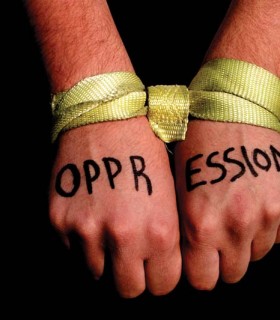Privilege is an increasingly common idea in political parlance, describing unearned circumstances affecting outcomes between groups. Yet privilege benefits from its own unearned circumstances: fewer competing ideas, limited—if any—rigorous debate, and more dangerously, the excoriation of nonconformists.
The Internet provides even the most obscure idea a collective voice. Within moments, social media and blogs unite once unmatched voices, propelling ideas into prominence. A blessing, and a curse.
There isn’t any shortage of people writing about privilege.
And that’s just a short list. As I’ve been able to observe most advocates of privilege (and other social justice) do so on their own time. Flip the coin for the faint outline of rebuttals and competing ideas. Privilege rides the wave of ubiquity, not excellence.
Occasionally, advocates suggest that they only desire people to recognize their privilege. Upon further inspection, we see recognition is not enough. Demands that: “the person w/ privilege has the responsibility to get out the way, listen, amplify…” are common and just the beginning. Mia McKenzie, writing at blackgirldangerous.org, tells privileged people:
“If you are a person with a lot of privilege (i.e. a white, straight, able-bodied, class-privileged, cisgender male or any combination of two or more of those) and you call yourself being against oppression, then it should be part of your regular routine to sit the hell down and shut the eff up.”
Over at the Washington Post, Sally Kohn points out:
“Being a constructive part of America’s necessary discussion on race and racial bias means acknowledging how bias and privilege may shape your own life . . . so you do have a responsibility as to whether you are part of the problem or part of the solution.”
Other writers use the concept of privilege as a catalyst to speak about social ills and how to fix them. While they may not suggest specific prescriptions, the logical conclusion is there for those willing to follow it. Take, for instance, New York Times Op-Ed columnist Nicholas Kristof’s four part series entitled “When Whites Just Don’t Get It.” Kristof spends much of his time assembling facts that show disparity, concluding this disparity is explained by white privilege.
As one reads, the message is clear: get on board, shut up, or both, if they’re being generous.
“If you tell a lie big enough and keep repeating it, people will eventually come to believe it. The lie can be maintained only for such time as the State can shield the people from the political, economic and/or military consequences of the lie. It thus becomes vitally important for the State to use all of its powers to repress dissent, for the truth is the mortal enemy of the lie, and thus by extension, the truth is the greatest enemy of the State.”
Godwin’s Law has, unfortunately, made Nazi comparisons cliché. We need to let go of this foolish stigma, history has much to teach us. People with bad ideas aren’t Nazis, and history can show us how some ideas play out—including, and in some cases, especially, the Nazis. Still, the specificity of Joseph Goebbels’ words requires a slight revision to be useful here:
“If you tell a lie big enough and keep repeating it, people will eventually come to believe it. The lie can be maintained only for such time as advocates can shield the people from any combination of political, economic or social consequences of the lie. It thus becomes vitally important for advocates to use all of its powers to repress dissent, for the truth is the mortal enemy of the lie, and thus by extension, the truth is the greatest enemy of advocates.”
More important than repetition defining truth is the vested interest advocates have in repressing dissent as belief in a lie grows (hence the calls to promote or get out of the way). It is not only the hearer who grows in belief as a lie is told, but also the speaker.
C.S. Lewis once noted:
“Of all tyrannies, a tyranny sincerely exercised for the good of its victims may be the most oppressive. It would be better to live under robber barons than under omnipotent moral busybodies. The robber baron’s cruelty may sometimes sleep, his cupidity may at some point be satiated; but those who torment us for our own good will torment us without end for they do so with the approval of their own conscience.”
Likewise to Goebbels’ quote, it is easy to consider this most applicable to government. Yet advocates of privilege and other social justice often bear both descriptions. Consider a fusion of the two:
“A tyranny sincerely exercised for the good may be the most oppressive. Those who torment us for our own good do so without end for the approval of their own conscience. They have spread an idea so loud, so frequently, it is of vital importance to repress dissent for the preservation of belief by others and even more so, themselves.”
Any oft-repeated idea, lie or not (“lie” implies foreknowledge of the truth, a common but unnecessary component), has the same effect. This bears great importance lest foregone conclusions be drawn.
“The only thing necessary for evil to triumph is for good men to do nothing.” - Edmund Burke
As John Stossel correctly points out: “[i]f we’re going to sort out which ideas are good and which are bad, everyone must be allowed to speak.” Not only permitted, but everyone must speak. Engaging (be it writing, social media, or just conversations with friends) enforces the burden of proof upon any idea through competing ideas, challenges for evidential support, or a combination.
As a strong believer in the exchange of ideas, and a critic of privilege and other social causes, what I accept is my responsibility to contribute to the exchange of ideas. No longer will privilege (or other ideas) be given the privilege of my silence. I encourage the same from others.
DL Cummings is an avowed freemarket capitalist and cultural thinker. He enjoys cycling, wine, history, economics, psychology, and everything in between. Occasionally motivations drive thought to pen where he hopes to inspire others to reconsider commonly held precepts.


